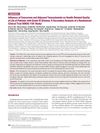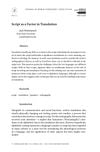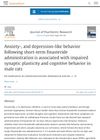 6 citations,
November 2007 in “Archives of Disease in Childhood: Education & Practice”
6 citations,
November 2007 in “Archives of Disease in Childhood: Education & Practice” The document concludes that accurate diagnosis of alopecia in children relies on thorough examination and history, and while treatments exist, none can alter the course of alopecia areata, which can significantly affect a child's psychological well-being.
 September 2023 in “Journal of Cosmetic Dermatology”
September 2023 in “Journal of Cosmetic Dermatology” Lower vitamin D levels are linked to higher CRP levels in people with a type of hair loss called alopecia areata.
 4 citations,
July 2021 in “Cancer Research and Treatment”
4 citations,
July 2021 in “Cancer Research and Treatment” Temozolomide improves survival in grade III glioma patients without harming quality of life.
 3 citations,
November 2020 in “Journal of The American Academy of Dermatology”
3 citations,
November 2020 in “Journal of The American Academy of Dermatology” The document suggests that more research is needed to confirm if baldness can indicate a higher risk of severe COVID-19 in men.
 2 citations,
October 2021 in “Asian Journal of Andrology”
2 citations,
October 2021 in “Asian Journal of Andrology” Medications for hair loss and prostate issues can significantly increase the risk of sexual side effects and other negative symptoms.
 March 2024 in “Skin research and technology”
March 2024 in “Skin research and technology” High CRP levels could indicate vitamin D deficiency in people with alopecia areata.
 2 citations,
August 2022 in “Clinical Case Reports”
2 citations,
August 2022 in “Clinical Case Reports” A 17-year-old girl had severe, on-and-off hair loss, likely due to COVID-19. She was treated with Vitamin D3, biotin, and other supplements, and saw some improvement within a month.
 August 2024 in “Journal of Cosmetic Dermatology”
August 2024 in “Journal of Cosmetic Dermatology” CGF injections may safely and effectively promote hair growth in androgenetic alopecia patients.
 May 2022 in “European medical journal”
May 2022 in “European medical journal” An 11-year-old girl with a hair-pulling disorder had a hairball in her stomach and was treated with medication, therapy, and a team of doctors.
 1 citations,
January 2016 in “Journal of world literature”
1 citations,
January 2016 in “Journal of world literature” The conclusion is that the type of writing system used can significantly affect the translation of a text.
10 citations,
January 2018 in “International Journal of Trichology” Mesalazine may help treat extensive alopecia areata effectively.
 October 2024 in “JEADV Clinical Practice”
October 2024 in “JEADV Clinical Practice” UK dermatologists commonly use corticosteroids and minoxidil to treat hair loss conditions.
 6 citations,
February 1974 in “The BMJ”
6 citations,
February 1974 in “The BMJ” The document concludes that scalp disorders can be treated with hair washing, specific shampoos, medications, and sometimes surgery or hair transplants, but hereditary baldness is untreatable.
5 citations,
December 2014 in “Molecular cytogenetics” A specific genetic change is linked to mental disorders, intellectual disability, and possibly autoimmune disease in a family.
 2 citations,
January 2013 in “Advances in Experimental Medicine and Biology”
2 citations,
January 2013 in “Advances in Experimental Medicine and Biology” Taurine might help prevent hair loss caused by stress.
 January 2014 in “International Journal of Athletic Therapy and training”
January 2014 in “International Journal of Athletic Therapy and training” A female runner's hair loss was caused by stress from surgery and recovery, but her hair returned to normal in 5 months.
 3 citations,
January 2019 in “International Journal of Trichology”
3 citations,
January 2019 in “International Journal of Trichology” The article concludes that treating hair loss requires careful research, understanding the causes, and personalized treatment plans.
 58 citations,
October 2001 in “Dermatologic Clinics”
58 citations,
October 2001 in “Dermatologic Clinics” Hair loss can indicate underlying systemic diseases and addressing these can sometimes reverse the hair loss.
 8 citations,
April 2020 in “Journal of Ethnopharmacology”
8 citations,
April 2020 in “Journal of Ethnopharmacology” Herbs might help with hair loss, but more research is needed to confirm their safety and effectiveness.
 19 citations,
May 2019 in “JAMA dermatology”
19 citations,
May 2019 in “JAMA dermatology” People with alopecia areata have similar overall death rates as others but higher risks of death from self-harm, psychiatric issues, and lung cancer in certain cases.
 August 2012 in “Journal of Evidence-based Medicine”
August 2012 in “Journal of Evidence-based Medicine” Minoxidil helps with hair regrowth in women with androgenic alopecia.
 April 2024 in “Journal of psychiatric research”
April 2024 in “Journal of psychiatric research” Short-term finasteride use in male rats caused anxiety, depression, and memory problems.
 April 2024 in “International journal of community medicine and public health/International journall of community medicine and public health”
April 2024 in “International journal of community medicine and public health/International journall of community medicine and public health” Female pattern hair loss greatly lowers quality of life, especially in young women.
 February 2024 in “Bangladesh pharmaceutical journal”
February 2024 in “Bangladesh pharmaceutical journal” The herbal hair oil increased hair growth and reduced hair fall for most users without significant side effects.
 September 2016 in “Gynecology Obstetrics and Reproductive Medicine”
September 2016 in “Gynecology Obstetrics and Reproductive Medicine” Effective treatment for skin issues in women with PCOS includes oral contraceptives, antiandrogens, and other medications and procedures.
 November 2024 in “Fizioterapevt (Physiotherapist)”
November 2024 in “Fizioterapevt (Physiotherapist)” High-intensity phototechnology, especially with other treatments, effectively improves quality of life for diffuse alopecia patients.
 October 2024 in “Dermatology Practical & Conceptual”
October 2024 in “Dermatology Practical & Conceptual” Vitamin D3 deficiency is common in Pakistanis with diffuse hair fall, and early treatment is advised.
 3 citations,
May 1980 in “American Journal of Nursing”
3 citations,
May 1980 in “American Journal of Nursing” Scalp tourniquets did not significantly prevent hair loss from chemotherapy.
 2 citations,
July 2020 in “Behavioural Brain Research”
2 citations,
July 2020 in “Behavioural Brain Research” Changing neuroactive steroids in baby male rats affects their memory and learning differently as they grow up.
 3 citations,
July 2019 in “International journal of scientific research in science and technology”
3 citations,
July 2019 in “International journal of scientific research in science and technology” Herbal hair gel with fenugreek seed extract was found to increase hair growth.



























